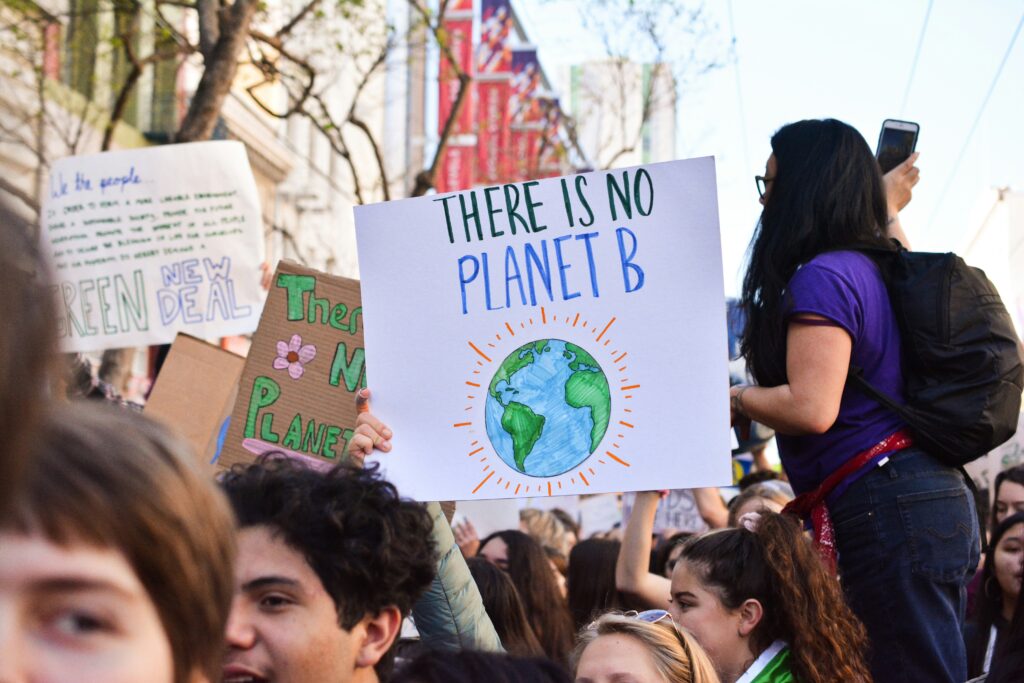Climate change has been a global issue. Over the years, the world has been encountering unpredictable climate transformations. Global warming plays a valuable role in this pattern. Research indicates that climate change is among the biggest global topics in this century due to its implications for the physical milieu and ecosystem, including on people’s lives (Zhao et al. 53). For example, unpredictable climate changes have been causing natural disasters, such as floods and hurricanes. With this, there have been numerous premature deaths. The fatalities occur due to the direct impact of the disasters or indirectly, secondary to communicable diseases. One exploration shows that climate change contributes to almost five hundred thousand deaths annually, estimated to rise to nearly seven hundred thousand by 2030 (Zhao et al. 53). All these climate changes emanate from uncontrolled environmental pollution that continues in the contemporary world. Most people have been embracing activism to call out those in positions of leadership to develop solutions to this growing problem. Despite most people perceiving Generation Z (Gen Z) as disengaged in their professional pursuits, they have spearheaded sustainability activism to enhance meaningful transformation which aims to resolve this global issue.
A Climate-Conscious Generation
Gen Z shows remarkable concern about the issue of climate change. One investigation indicates that 85% of adolescents and young adults aged between 16 and 25 endorsed the fact that they had moderate anxiety originating from this issue, especially considering its effects on people and the entire planet (Lewandowski et al., e879). In the same research, more than 40% of the respondents disclosed that climate change has harmed their mental health, with approximately 38% noting that it has influenced their daily lives (Lewandowski et al. e879). All these findings evoke the same issue: Gen Z is more climate-conscious than previous cohorts. As shown in Figure 1 below, 85.3% of Gen Z respondents noted the use of fossil fuels and other unsustainable energy sources as a major cause of climate change, 59.4% indicated deforestation, and 54% mentioned transport emissions (Bogueva and Marinova 2512). Climate change has massive emotional and psychological ramifications. For example, weather-related disasters like hurricanes and floods lead to unprecedented mortalities and morbidities. Many families also become displaced following these occurrences. These impacts explain the source of the emotional and psychological torture associated with the climate change issue. When considering the mental health perspective, there is climate anxiety among Gen Z. Research indicates that their concern for this issue triggers problems, including depressive symptoms and generalized anxiety (Lewandowski et al. e880). With this, adolescents and young adults remain at risk of falling into substance abuse disorders or experiencing suicidal thoughts. As Albert Einstein once said “in the midst of every crisis lies opportunity” (Leddin 529). Consequently, the psychological impacts are becoming a powerful motivator for activism among Gen Z. The group feels betrayed by the inaction of older generations, calling for them to take personal responsibility. Gradually, the generation has engaged in concrete habits aimed at decreasing their personal carbon footprints. Therefore, current research suggests that Gen Z is conscious of the growing climate change problem.
Figure 1: Contributors to climate change (Bogueva and Marinova 2512).
Youth Climate Movements and Protests
Youth-led initiatives have been on the rise. Current research demonstrates that youth activism in climate change is on an upsurge with activist Greta Thunberg sparking the global Fridays For Future model in 2018, which called for students to participate in school strikes and walkouts with the aim of convincing those in leadership positions to adopt proper climate action and make interventions (Neas et al. 2). In the U.S., similar events have happened over the past years. The most prominent ones included the Zero Hour and Sunrise movements in 2017 and the Earth Uprising team of 2019 (Meunier). These movements started due to activism led by progressive-minded Gen Zs in the United States and continue to be active nationwide. The primary objective of these movements and organizations is to raise awareness of the environmental pollution that continues in the contemporary world. Roughly two years ago, the U.N. secretary general, António Guterres, indicated that “… we are experiencing climate collapse in real time” (Martini et al. E494). The statement revealed the need for urgent solutions to the problem, including alternative energy systems. Through their activities, these youth-led movements aim to dissuade people from using fossil fuels and encourage them to embrace alternative energy sources. Adopting low or zero-carbon power sources, such as solar, wind power, and bioenergy, would help curb or reduce greenhouse gas emissions, slowing global warming. Gen Z shared placards with illustrations of the potential impacts of consistent global warming and offering solutions during the strikes and movements. Doing so disrupts the mental conformity that people cannot affect the climate change issue. Instead, the uprising has been valuable in demanding change from all stakeholders. Prevailing statistics also support the beneficial role that Gen Z plays in activism. In Figure 2 below, it is evident that Gen Z has been more active than previous gens in handling climate change. The graph shows that at least 32% of Gen Z respondents indicated that they had personally participated in an action meant to tackle climate change within the past twelve months. The engagement level was quite high when one compares it with the level shown by baby boomers, which accounted for only 21%. 37% of Gen Z participants in this exploration also noted that handling climate change issues was their top concern at a personal level, which is remarkable compared to the other low percentages for different generations (Tyson et al. 5). As such, Figure 2 is an excellent depiction of the generational gap that exists in contemporary times when analyzing the issue of climate change activism and participation. So, the climate movements and protests have been significant in seeking changes to improve climate change.
Figure 2: Climate change activism by generation (Tyson et al. 5).
Political Impacts
Climate activism led by Gen Z is moving towards policymaking. Youth leaders realized that street protests were not sufficient in handling climate change. Instead, they opted to focus on influencing elections and voting for leaders who would advocate for climate change from a policy-making perspective. For example, the Sunrise movement supported twenty candidates vying for congressional positions in 2018, with ten of them securing their positions (Meunier). Doing so would enable the movements to have climate-focused candidates in congress and other valuable elective positions capable of influencing policies and bringing their targeted positive change. Gen Z has also become a valuable voting bloc in the U.S., as they aim to accomplish their primary objective related to climate change action. Current literature notes that in 2022, the Sunrise movement engaged and encouraged over three million voters to participate in elections, resulting in the highest youth turnout within the past three decades (Meunier). Once voted in, the climate champions remain tasked with establishing bills that intend to resolve the global problem. An excellent example is the Green New Deal (GND) resolution. Research shows that the GND was brought to fruition by Rep. Ocasio-Cortez and Senator Markey in coordination with the Sunrise movement, aiming to handle climate change mitigation and eradicate economic inequalities originating from this problem (Galvin and Healy 101529). This resolution aims to encourage people to embrace activities that attain net-zero greenhouse gas emissions. When doing so, people must implement these interventions in a fair and just way to guarantee the safety and well-being of all community members. During the adoption of these interventions, stakeholders should also create employment opportunities to support the prosperity of Americans. In one exploration, almost 73% of Gen Z indicated that they had a plan to vote for leaders who promised to develop aggressive climate policies (Lewandowski et al. e879). Doing so ensures that Gen Z keeps climate change in the public eye and holds politicians accountable. Thus, engaging in the electoral process and voting enables Gen Z to force the issue onto the agenda via real policy establishment and implementation.
Climate Activism in the Workplace
Gen Z activism is becoming prominent in the workplace. With most coming of age and entering the employment market, they continue to bring their environmental values. Doing so enables them to demand change from within firms. Research indicates that Gen Z continues to be perceived as the woke generation that does not hold back when it comes to sharing their views on issues that concern them, particularly climate change (Sengupta et al. 249). In the U.S., most members of Generation Z perceive climate change as being among the three fundamental global issues, indicating their concern (Sengupta et al. 249). With this, most Gen Zers wish to work in organizations that promote social, economic, and environmental justice. They also prefer and encourage their workplaces to deploy sustainable measures to prevent environmental pollution. When an employer falls short, Gen Z remains indebted to voice their objections, or when things get worse, to quit such workplaces. Overall, the generation shows a massive shift in workplace expectations. Previous generations prioritize wages and job stability. Conversely, Gen Z is raising the bar by incorporating corporate responsibility as the most fundamental aspect. Figure 3 below shows why Gen Z must embrace such an approach, with most respondents indicating that large companies are deploying the fewest measures in helping decrease the impacts of global climate change (Tyson et al. 8). So, climate activism is valuable in handling this problem.
Figure 3: Analysis of least engagement in climate change (Tyson et al. 8).
Although appearing as disengaged, Gen Z’s multifaceted climate activism remains a valuable tool for tackling global climate change. The generation has been vocal in advocating for policies and business practices that enhance sustainability. Gen Z has been organizing street protests to raise awareness of this problem. Engaging and encouraging people to vote in climate champions has also been valuable. All these efforts have led to ambitious new climate laws aimed at curbing greenhouse gas emissions and promoting the use of alternative energy sources. Thus, Gen Z’s commitment continues to drive transformative change and positive climate action.
Works Cited
Bogueva, Diana, and Dora Marinova. “Australian Generation Z and the Nexus Between Climate Change and Alternative Proteins.” Animals, vol. 12, no. 19, Sept. 2022, p. 2512. https://doi.org/10.3390/ani12192512.
Galvin, Ray, and Noel Healy. “The Green New Deal in the United States: What It Is and How to Pay for It.” Energy Research & Social Science, vol. 67, Apr. 2020, p. 101529. https://doi.org/10.1016/j.erss.2020.101529.
Leddin, Desmond. “The Impact of Climate Change, Pollution, and Biodiversity Loss on Digestive Health and Disease.” Gastro Hep Advances, vol. 3, no. 4, Jan. 2024, pp. 519–34. https://doi.org/10.1016/j.gastha.2024.01.018.
Lewandowski, R. Eric, et al. “Climate Emotions, Thoughts, and Plans Among US Adolescents and Young Adults: A Cross-sectional Descriptive Survey and Analysis by Political Party Identification and Self-reported Exposure to Severe Weather Events.” The Lancet Planetary Health, vol. 8, no. 11, Oct. 2024, pp. e879–93. https://doi.org/10.1016/s2542-5196(24)00229-8.
Martini, Mariano, et al. “The Health of Mankind and the Health of the Planet in a Historical-ethical Perspective: An Inseparable Relationship and a Single Destiny.” Journal of Preventive Medicine and Hygiene, vol. 64, no. 4, Dec. 2024, pp. E493–98. https://doi.org/10.15167/2421-4248/jpmh2023.64.4.3156.
Meunier, Melanie. “Translating Anxiety Into Action: Youth Climate Activism During the Biden Administration, 2020-2024.” IdeAs, vol. 24, Jan. 2024, https://doi.org/10.4000/12hs7.
Neas, Sally, et al. “Young People’s Climate Activism: A Review of the Literature.” Frontiers in Political Science, vol. 4, Aug. 2022, https://doi.org/10.3389/fpos.2022.940876.
Sengupta, Debashish, et al. “Sustainability Orientation of Generation Z and Its Role in Their Choice of Employer—A Comparative Qualitative Inquiry of India and United States.” Administrative Sciences, vol. 14, no. 10, Oct. 2024, p. 249. https://doi.org/10.3390/admsci14100249.
Tyson, Alec, et al. “Gen Z, Millennials Stand Out for Climate Change Activism, Social Media Engagement With Issue.” Pew Research Center, 26 May 2021, www.pewresearch.org/science/2021/05/26/gen-z-millennials-stand-out-for-climate-change-activism-social-media-engagement-with-issue.
Zhao, Qi, et al. “Global Climate Change and Human Health: Pathways and Possible Solutions.” Eco-Environment & Health, vol. 1, no. 2, May 2022, pp. 53–62. https://doi.org/10.1016/j.eehl.2022.04.004.








